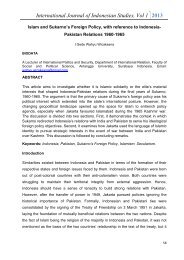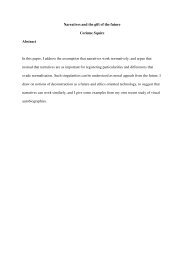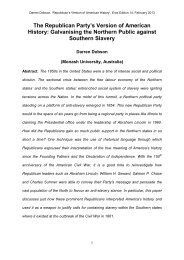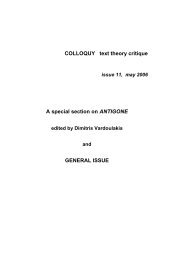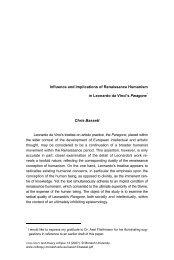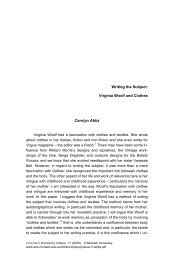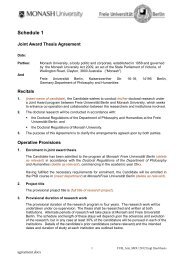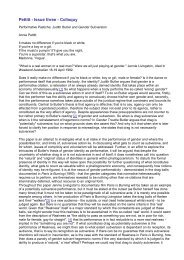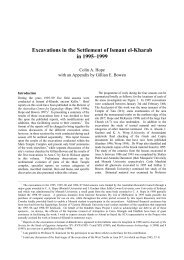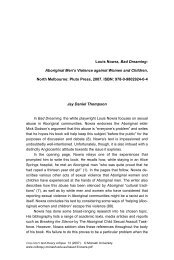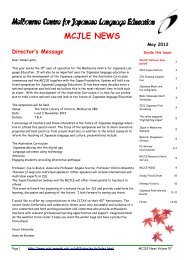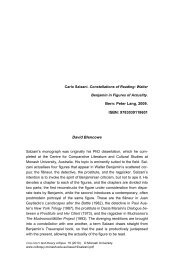The Acknowledgement of Love in Sarah Ruhl's Drama ... - Arts
The Acknowledgement of Love in Sarah Ruhl's Drama ... - Arts
The Acknowledgement of Love in Sarah Ruhl's Drama ... - Arts
You also want an ePaper? Increase the reach of your titles
YUMPU automatically turns print PDFs into web optimized ePapers that Google loves.
16Thomas Butler░on Cavell: “At all events acknowledgment means openness and acceptance<strong>of</strong> the other as such, that is, as other, as that which resists everyeffort on my part to reduce it to someth<strong>in</strong>g conta<strong>in</strong>able with<strong>in</strong> the legislation<strong>of</strong> my concepts. <strong>The</strong> other is excessive with respect to this legislation.” 28K<strong>in</strong>g Lear, Cavell’s argument goes, dramatises the difficulty people have <strong>in</strong>acknowledg<strong>in</strong>g others as <strong>in</strong>dividuals and not as whatever may accord withtheir cognitive grasp <strong>of</strong> them. 29This conflict between know<strong>in</strong>g and acknowledg<strong>in</strong>g is central to the firstscene <strong>of</strong> the play, the famous love test. Lear convenes his court to witnesshis three daughters’ displays <strong>of</strong> love for him as he divides his k<strong>in</strong>gdom.“Lear knows it is a bribe he <strong>of</strong>fers, and—part <strong>of</strong> him anyway—wants exactlywhat a bribe can buy: (1) false love and (2) a public expression <strong>of</strong> love.That is, he wants someth<strong>in</strong>g he does not have to return <strong>in</strong> k<strong>in</strong>d, someth<strong>in</strong>gwhich a division <strong>of</strong> his property fully pays for.” 30 Cordelia, <strong>of</strong> course, foilsthe pageantry by refus<strong>in</strong>g to cheapen her love to satisfy Lear’s pomp. Cavellma<strong>in</strong>ta<strong>in</strong>s that Cordelia is not be<strong>in</strong>g impudent <strong>in</strong> her refusal to playLear’s game. Instead, her deep and genu<strong>in</strong>e love has no place <strong>in</strong> a spectacledemand<strong>in</strong>g false love. Lear needs false love because he is unable toacknowledge real love, that is, love that upends formulaic expectations.Cavell argues that even <strong>in</strong> the f<strong>in</strong>al scene <strong>of</strong> the play Lear is still unableto acknowledge Cordelia’s love. Lear’s speech, which Eurydice’s fatherreads, is Lear’s fantasy <strong>of</strong> retreat<strong>in</strong>g from the world with his daughterwhere, importantly for Cavell, they would be unseen and unrecognised bythe rest <strong>of</strong> the world. “His tone is not: We shall love even though we are <strong>in</strong>prison; but: Because we are hidden together we can love. He has come toaccept his love, not by mak<strong>in</strong>g room <strong>in</strong> the world for it, but by deny<strong>in</strong>g itsrelevance to the world. He does not renounce the world <strong>in</strong> go<strong>in</strong>g to prison,but flees from it, to earthly pleasure.” 31 <strong>Love</strong>, for Lear, can only take theform <strong>of</strong> a fantasy cut <strong>of</strong>f from life. Cavell stresses that Lear does not act out<strong>of</strong> senility or malice; rather, his <strong>in</strong>ability to acknowledge love is commonplaceand is not limited to the world <strong>of</strong> the play: “For some spirits, to beloved know<strong>in</strong>g you cannot return that love is the most radical <strong>of</strong> psychic tortures.”32Unable to acknowledge Cordelia as a separate <strong>in</strong>dividual alive <strong>in</strong> theworld, Lear resorts to propos<strong>in</strong>g his fantasy <strong>of</strong> their union apart from theworld. Notice, for example, that he never <strong>in</strong>quires about Cordelia’s husband,whom he would presumably take to be an encumbrance from the realworld. Lear’s vision has the two removed from the world jo<strong>in</strong><strong>in</strong>g together<strong>in</strong> a harmonious duet: “We two alone will s<strong>in</strong>g like birds i’th’cage.” 33 As theplay makes abundantly clear, such a fantasy is impossible to fulfil.What is the alternative? If a love-relation based on unity and removal



